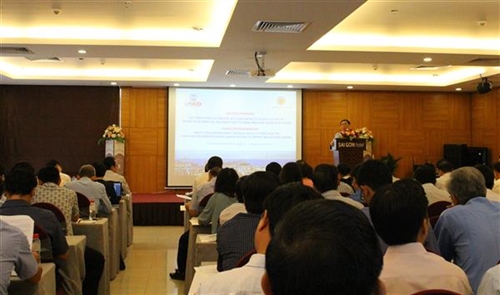Bui Duc Giang
Attorney at law and PhD in law[1]
Immovable property remains the most significant secured property in Vietnam. Civil Code No. 91/2015/QH13 dated November 24, 2015 (the 2015 Civil Code), which became effective on January 1, contains many changes to the legal framework applicable to security over immovable property that this article will try to point out.
Attachment and perfection
Concept of immovable property
Pursuant to Clause 1, Article 107 of the 2015 Civil Code, “immovable property consists of (i) land; (ii) houses and construction works attached to land; (iii) other property attached to land, houses and construction works and (iv) other property as provided by law”.
Regarding item (iv), for instance, Clause 2, Article 3 of Joint Circular No. 09/2016/TTLT-BTP- BTNMT of the Ministry of Justice and the Ministry of Natural Resources and Environment, dated June 23, 2016, guiding registration of land use rights and property attached to land, considers investment projects on construction of residential houses and construction works as future property attached to land. However, if the possibility of taking a charge over an investment project on construction of residential houses is expressly provided in Circular 09 and the legislation regulating residential houses, using a construction work project as security remains so far questionable.
Forms of security
Security over immovable property can be taken by way of charge or pledge. It is noteworthy that while a charge over immovable property is a traditional security interest, a pledge over immovable property is a new one[2]. However, the 2015 Civil Code remains quite brief in providing that “where an immoveable property is the subject matter of a pledge in accordance with a law, the pledge of such immoveable property shall be enforceable against a third person as from the time of registration” (Clause 2, Article 310). A law in this article has the meaning of an act passed by the National Assembly of Vietnam. As such, it is possible to take security over immovable property by way of pledge only when the Land Law, the Law on Housing, the Law on Real Estate Business or other relevant laws so permit.
The difference between a pledge and a charge is that the former requires delivery of possession of the property whilst the latter does not. The requirement of delivery of possession would make the new security interest awkward in the sense that the creditor would have to hold the real property and incur expenses to keep it in good condition. Furthermore, the fact that the creditor retains possession of the pledged property means that pledges are not generally used as security devices by companies raising finance. This is why banks are sceptical of this new type of security.
Delivery of documents of title relating security property
Clause 1, Article 320 of the 2015 Civil Code provides that the chargor shall “deliver documents of title relating to the charged property if the parties so agree, unless otherwise provided by a law”. Documents of title relating to the charged property may be certificates of land use rights and ownership of residential houses and other property attached to land, contracts for lease of land from the State, decisions on allocation of land by the State, contracts for assignment of land use rights, contracts for sale of assets attached to land, etc. This article means that in the absence of agreement on delivery of such documents to the creditor, the chargor is not required to deliver them to the creditor. However, bank charge templates usually contain such requirement.
Immovable property of households
In practice, it may happen that banks take security over an immovable property owned by a household.
Although Clause 1, Article 101 of the 2015 Civil Code expressly provides that a household does not have the legal entity status, Clause 2, Article 101 of this Code prescribes that “determination of the subject of a civil relation involving a household using land shall be done in accordance with the Land Law”.
Pursuant to Clause 29, Article 3 of Land Law No. 45/2013/QH13 dated November 29, 2013 (the Land Law), a household using land comprises all persons who have a marital relationship, blood relationship or rearing relationship in accordance with the law on marriage and family, currently living together and having the joint land use rights at the time of land allocation, land lease or recognition by the State of the land use rights, or at the time of being transferred the land use rights.
Up to now, the law does not provide further guidance on the determination of a household, causing a lot of troubles for banks in practice.
Under Clause 2, Article 212 of the 2015 Civil Code, the disposal of immovable property must be agreed upon by all the household members who are adults[3] with full civil act capacity, unless otherwise provided by law.
Clause 1, Article 64 of Decree No. 43/2014/ND-CP dated May 15, 2014, providing detailed guidance on the implementation of the Land Law as amended in 2017 (‘Decree 43’), prescribes that “contracts and transaction documents on land use rights and/or ownership of property attached to land of households must be signed by the person(s) named in the (land) certificate or authorized persons in accordance with the civil law”. As such, the persons named on the certificate of land use rights and ownership of residential houses and other property attached to land or their authorized representatives will have the authority to sign the charge.
A further condition is provided in Clause 5, Article 14 of Circular No. 02/2015/TT-BTNMT of the Ministry of Natural Resources and Environment dated January 27, 2015, under which those persons may sign the charge only if all household members have given their consent in writing and such written consent has been duly notarized or authenticated.
Registration
Under Clause 1, Article 298 of the 2015 Civil Code, “security is registered as agreed or provided by a law. Registration shall be a condition of validity of a security transaction only when a law so provides”.
Clause 3, Article 188 of the Land Law provides that charges over land use rights must be registered with the land registration office and will take effect from the time of registration in the cadastral register. As such, a charge over land use rights must be registered to be valid. At this regard, it should be noted that not only Clause 3, Article 167 of the Land Law requires that contracts of charges over land use rights and contract of charges over land use rights and property attached to land but also it seems to require that contracts of charges over property attached to land be notarized or authenticated to ensure their enforceability.
Under Clause 1, Article 297 of the 2015 Civil Code, “security shall be enforceable against a third person as from the time the security is registered or the secured obtains or takes possession of the secured property”. Therefore, in case of a charge over an immovable property, the registration of the charge also ensures its enforceability against third parties.
 |
| My Dinh urban center in Hanoi__Photo: Huy Hung/VNA |
Enforcement
Methods of enforcement
As the 2015 Civil Code has no specific provision on the realization of charges over immovable property, the general rules on enforcement of charge and pledge over property will apply[4].
Under Clause 1, Article 303 of the 2015 Civil Code, the parties may agree that the pledged or charged property will be realized in one of the following ways:
- the property will be sold by auction;
- the creditor will itself sell the property;
- the creditor will appropriate the property in replacement of performance of - the secured debt by the securing party; or
- other methods[5].
Furthermore, a sale by auction automatically applies when the parties have not agreed on any way of enforcement, except where a law otherwise provides (Clause 2, Article 303 of the 2015 Civil Code).
In practice, sale by auction is very common to dispose of secured immovable property. It is noteworthy that as from July 1, 2017, sale by auction will be subject to Law No. 01/2016/QH14 on property auction dated November 17, 2016.
Notice to the parties concerned
Article 300 of the 2015 Civil Code makes notice to the securing party and other secured creditors compulsory. It provides that “prior to realizing the secured property, the secured party shall provide written notice within a reasonable period of time of realization of the property to the securing party and other secured creditors. When the secured property is in danger of being damaged resulting in its diminishing in value or losing its entire value, the secured party will have the right to immediately realize such property and at the same time shall notify the securing party and other secured creditors of the property realization”.
As “reasonable period of time” is a vague concept and the law has not so far indicated what period of time would be considered reasonable in case of realization of a charge over real property, it is desirable that the parties indicate in the security document or other document a specified period of time for giving a notice.
If the creditor fails to give a notice, thus causing damage to the securing party and/or other secured creditors, it must pay compensation for this damage (Clause 2, Article 300 of the 2015 Civil Code).
Valuation of secured property
The parties may agree on the price of the secured property or to revert to a valuation entity to determine the value of the property on enforcement (Clause 1, Article 306 of the 2015 Civil Code). Such agreement may be contained in the security document or be entered into at a later stage.
Clause 1, Article 306 of the 2015 Civil Code provides that “in the absence of an express agreement between the parties, the property shall be valued by a property valuation entity”. It appears from this article that in case the security document gives the lender a power of sale, it may revert to a property valuation entity with a view to determining the value of the secured property which will serve as a basis for the sale.
Clause 2, Article 306 of the 2015 Civil Code requires that the property concerned be valued objectively and in conformity with the market price. This requirement aims at protecting the securing party to avoid risks of undervaluation. Notably, the property valuation entity will be obligated to obtain the market value of the property when determining its value. It will have to indemnify the securing party and creditor against any damage caused to them in case of violation of the law (Clause 3, Article 306 of the 2015 Civil Code).
Specific cases
Clause 3, Article 318 of the 2015 Civil Code prescribes that “in case land use rights are charged and the chargor is the owner of the property attached to land, such property attached to land may also form part of the charged property, unless otherwise agreed”.
As per Clause 1, Article 325 of the 2015 Civil Code, “in case a charge attaches to land use rights but not to the property attached to the land and the land user is also the owner of the property attached to the land, then the property to be realized must include the property attached to the land, unless otherwise agreed”.
The position of the 2015 Civil Code is very favorable to creditors but appears to conflict with the housing legislation under which to have effective security over the property attached to land, the parties must have created such security in compliance with various requirements in terms of form and substance set forth therein.
Pursuant to Clause 2, Article 325 of the 2015 Civil Code, “in case a charge attaches to land use rights but the land user is not also the owner of the property attached to the land[6], then on realization of the land use rights, the owner of the property attached to the land may continue to use the land within its rights and obligations; and the rights and obligations of the chargor in the relationship with the owner of the property attached to the land shall be transferred to the person receiving the transfer of the land use rights, unless otherwise agreed”.
Article 326 of the 2015 Civil Code deals with the case where a charge attaches only to the property attached to land but not to the land use rights. Two circumstances arise:
- if the owner of the property attached to the land is also the land user, the property to be realized must include the land use rights, unless otherwise agreed.
- If the owner of the property attached to the land is not the land user, on realization of the property attached to the land, the person receiving the transfer of the ownership right over such property attached to the land may continue to use the land within the rights and obligations of the owner of the property attached to the land subject to the transfer, unless otherwise agreed.-









